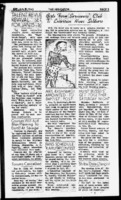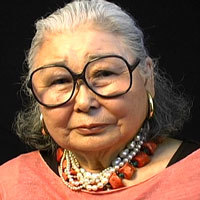Karuta in the United States in the Early 20th Century 20世紀のアメリカにおけるかるた
On the other side of the Pacific Ocean, Japanese Americans who had been sent to internment sites called "Relocation Centers," run by the War Relocation Authority left traces of the game as well. There are over 20 references to karuta in the English sections of the digitized collection of camp newspapers from 1942-1946. Most are announcements of tournaments or invitations to join various amusements including karuta.
Rose Nieda, a second generation Japanese American and internment camp survivor, was interviewed about her life as part of the 'Telling Stories' project, in in 2005 and 2006. Ms. Nieda decribes growing up in the 1920s and 1930s in Washington State, and mentions that she played karuta as a child, prior to going to the camp. Describing karuta, she says she learned Japanese proverbs - not the militaristic and patriotic poems, slogans and vocabulary we see in the sets featured on this site. She says,
"Yes, we played a lot of games. We played ping pong. We played card games like gin rummy, and we played Karuta which was a Japanese game. My mother was instilling in me all these mottos like "When a dog walks it gets hit" and all that kind of stuff. Of course, it was in Japanese. Now that it comes back to me, she was programming me...
[others she remembers?] A lot of things like "If the tree grows, the wind will blow it down." "The fire is on the other side of the river." This is all in Japanese, so it's kind of a poetic thing. Also, at the same time, you are learning Japanese. You begin to sing-song it. And then you relate the motto to the picture, so it was a lot of fun. Especially the one where he says something about "You can hide your head but you don't hide the other part"—there was a man with his head covered. Do you remember that one? You didn't play those games? Oh."


